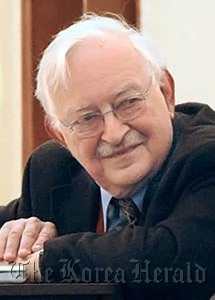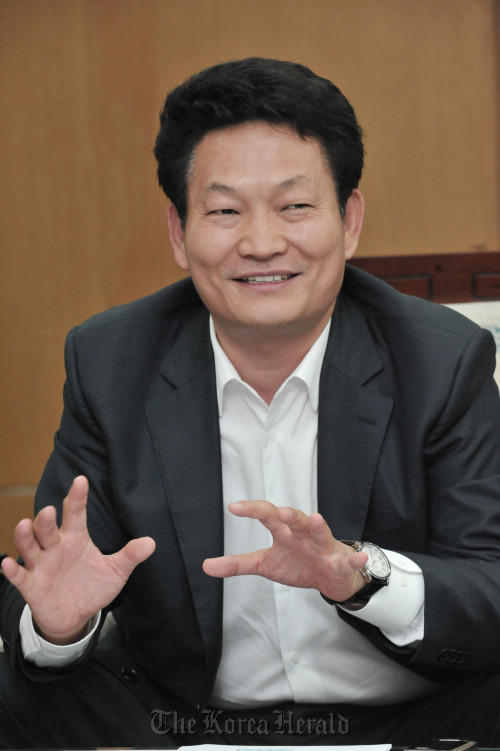Northeast Asia is emerging as one of the four “Global North” centers of geopolitical autonomy, and South Korea has the potential to take the initiative in integrating the region further.
So said Immanuel Wallerstein, senior research scholar at Yale University, and Incheon Mayor Song Young-gil in a joint interview with Herald Media. Wallerstein visited Seoul to attend the 2010 Asia Economic Community Forum, Nov. 7-9 in Incheon. The forum was co-sponsored by Herald Media and Incheon. The interviews were conducted by University of Incheon Professor and AECF Secretary General Park Je-hoon.
Wallerstein said that the world had eight to ten centers of geopolitical autonomy, with the four strongest centers located in the so-called Global North. The four centers are the United States, Western Europe, Russia and Northeast Asia, consisting of South Korea, China and Japan.
So said Immanuel Wallerstein, senior research scholar at Yale University, and Incheon Mayor Song Young-gil in a joint interview with Herald Media. Wallerstein visited Seoul to attend the 2010 Asia Economic Community Forum, Nov. 7-9 in Incheon. The forum was co-sponsored by Herald Media and Incheon. The interviews were conducted by University of Incheon Professor and AECF Secretary General Park Je-hoon.
Wallerstein said that the world had eight to ten centers of geopolitical autonomy, with the four strongest centers located in the so-called Global North. The four centers are the United States, Western Europe, Russia and Northeast Asia, consisting of South Korea, China and Japan.

He said that Northeast Asia faces structural pressure to integrate, noting a strong economic logic over territorial conflicts.
Song, agreeing to the importance of Northeast Asia in the global economy, called for the upgrade of the Northeast Asian community from market-based to institution-based integration. He said that Korea could come up with creative ideas to lead the process. Listing reasons why the nation is capable of taking the initiative in building the regional community, the mayor cited its rapid economic growth and democratization. Wallerstein concurred, saying Korea can play a key role in modulating China-Japan relations.

On the North Korea issue, the Incheon mayor, well known for his enthusiasm toward revitalizing inter-Korean cooperation, made a point of the benefits of a soft landing for North Korea. He regarded aid to the North as a way to cut reunification costs.
He then highlighted the leading role of Incheon in South Korea’s efforts for reconciliation with the North. He said that Incheon plans to provide humanitarian assistance to North Korea and to encourage it to participate in the 2014 Asian Games in the city.
The following are excerpts from their interviews:
Park: Professor Wallerstein, at your keynote address, you mentioned that there are emerging eight to ten centers of relative geopolitical autonomy. The four strongest such centers are located in what is sometimes called the Global North. What are the other four to six centers?
Wallerstein: India obviously; also Brazil/South America, South Africa/southern Africa, Iran, Indonesia, Australia.
Park: Mayor Song, I know that you emphasized the importance of cooperation among South Korea, Japan and China. Would you elaborate on the roles of South Korea in realizing a “Northeast Asian Community”?
Song: Northeast Asian countries have implemented quantitative easing and expansionary fiscal policies to tackle the financial crisis that emanated from the U.S. subprime mortgage meltdown. Nevertheless, industrial production and growth rates slowed down rapidly.
At present, the integration of the Northeast Asian economy is market-based. China, Japan, and Korea should guide the region to move toward integration based on institutions, ultimately establishing the “Northeast Asian Community.”
Korea is a country that can play a leading role by proposing creative ideas in the process.
It has simultaneously achieved economic growth and democratization. With the most neutral position in the region, it is a nation that will not make attempts to gain certain hegemony. In this sense, Korea is the best candidate to take the initiative in building the “Northeast Asian Community.”
I believe Korea will play a vital role in reflecting on regional cooperation built since the outbreak of the 1997 financial crisis. It will also take an important part in proposing a vision on the direction for regional integration under the current political and economic circumstances.
Wallerstein: South Korea can play a key role in modulating the China-Japan relationship.
Park: Professor Wallerstein, you referred to structural pressure to integrate further in Northeast Asia. You stressed a strong economic logic to further integration. It seems to me rather too optimistic. Recently we saw tense conflicts around territorial issues. Also you pointed out nationalism as a positive factor for integration. To us, nationalism is a strong bottleneck to regionalism. We need to hear more from you about this.
Wallerstein: When one speaks of structural pressures, one speaks of forces that outweigh and overcome the repeated frictions (such as those about territorial issues). I spoke of nationalism as a force for Korean and Chinese unification, not as a force for Northeast Asian integration.
Park: Mayor Song, you have been very much enthusiastic about revitalizing cooperation between North and South Korea. Would you elaborate your views on that? In relation to this question, how about the roles of Incheon for revitalizing cooperation between North and South Korea?
Song: Supporting the North in avoiding a collapse and making a soft landing, thereby achieving economic self-sufficiency and growth, is a way to cut reunification costs.
Incheon is located at the maritime border between the North and the South. It is also the gateway for exchange and cooperation between the two. In this regard, I plan to develop the city into the center for inter-Korean reconciliation and cooperation, repositioning the Yellow Sea, the sea of dispute, as the sea of peace.
In line with this, Incheon will expand economic exchange with North Korea by pursuing fair trade from next year. Humanitarian support including the provision of bread, powdered milk, and medical supplies will be implemented. We are also considering the option of encouraging the North to participate in the 2014 Incheon Asian Games.
Incheon will form an industrial cluster linking Haeju, Gaeseong, and Incheon as the beachhead for inter-Korean economic cooperation and the Northeast Asian economic hub.
Park: Professor Wallerstein, you said that there is no other currency today to replace the dollar as a reserve currency. In that case, if the dollar fails, there will be no reserve currency. We shall be in a multipolar currency world. And a multipolar currency world is a very chaotic world. One real possibility is that the world may revert to de facto barter arrangements. The G20 Seoul Summit will deal with that currency issue. Are you expecting a negative result?
Wallerstein: Nothing will happen. Just words, no serious decisions. It will end in a fruitless meeting.
Park: How do you predict the future of the G20? Could it play a role as the premium forum for resolving the global economic crisis in the short run or not?
Wallerstein: Yes, there will be a future for the G20. It will play a more important role than the G2 (a proposed informal partnership between the U.S. and China).
Park: Professor Wallerstein, you are arguing that there is virtually no real evidence of the great U.S.-China split. But unlike the last 30 years, recently we are seeing many conflicts between these two giants as a result of rapid China’s rise. We want to hear more from you about this.
Wallerstein: Even though conflicts between these two have increased recently, still they will be very careful about each other. They are playing to the gallery.
By Chun Sung-woo (swchun@heraldcorp.com)







![[Graphic News] More Koreans say they plan long-distance trips this year](http://res.heraldm.com/phpwas/restmb_idxmake.php?idx=644&simg=/content/image/2024/04/17/20240417050828_0.gif&u=)
![[KH Explains] Hyundai's full hybrid edge to pay off amid slow transition to pure EVs](http://res.heraldm.com/phpwas/restmb_idxmake.php?idx=644&simg=/content/image/2024/04/18/20240418050645_0.jpg&u=20240419100350)





![[From the Scene] Monks, Buddhists hail return of remains of Buddhas](http://res.heraldm.com/phpwas/restmb_idxmake.php?idx=652&simg=/content/image/2024/04/19/20240419050617_0.jpg&u=20240419175937)

![[KH Explains] Hyundai's full hybrid edge to pay off amid slow transition to pure EVs](http://res.heraldm.com/phpwas/restmb_idxmake.php?idx=652&simg=/content/image/2024/04/18/20240418050645_0.jpg&u=20240419100350)

![[Today’s K-pop] Illit drops debut single remix](http://res.heraldm.com/phpwas/restmb_idxmake.php?idx=642&simg=/content/image/2024/04/19/20240419050612_0.jpg&u=)